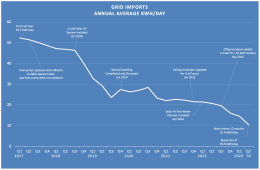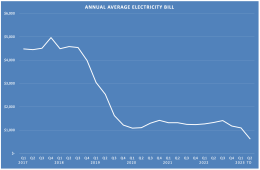I am curious about Australia, where I understand they have a very high percentage of homes on solar, so what did they do with their utility connections/by-laws and can we learn something from their experience.
One in three homes has a solar PV system, and still growing strongly. The vast majority (it must be 99+%) are grid-tied. Only a very small proportion of those have a battery storage system. That's because grid-tied solar PV is cheap (way cheaper than in the USA) and is a financial no brainer for any homeowner with a suitable rooftop, while home battery financials suck dogs' balls.
Off-grid is uncommon, usually confined to remote areas where the grid is not available, or those few who have just decided to cut the cord (very few do).
Governments here have encouraged home solar PV. Both sides of the political spectrum, it's just not a partisan issue. Indeed it was our most conservative Prime Minister who was in power in the early 2000's when the federal Small-scale Technology Certificate program was introduced to help encourage the uptake of solar PV. It ends in 2030, and has a gradual wind down each year. State Govts of all persuasions have each had their own incentive schemes.
As to the physical installation of solar PV, there are approval processes and there are standards for installation. The installation standards are uniform across the nation (but mean DIY is very hard to do, even for off-grid) and managed by a standards body.
The local power distribution companies (there are about a dozen or so across the country) regulate the approval processes for their region for grid-tied solar PV. Usually this means limits on the inverter capacity which may be installed per phase (for residential that's typically 10 kW) and a maximum export power limit is also set (typically 5 kW/phase), so export limiting is pretty common. These limits do vary by region (e.g. in rural/remote areas they tend to be lower).
We are starting to move to dynamic export limitation in some jurisdictions, e.g. in South Australia all new installations will have this capability. So they have lifted the export power limit to 10 kW/phase, but on the few occasions a year it needs to be curtailed because there is inadequate system demand, then the utility can throttle back how much inverters can export. It's smart and will enable even more solar PV capacity into the grid, perfect for the less than stellar solar production days.
Off-grid is not prohibited, it's just not particularly viable (financially) if you already have a grid connection. The power distribution companies couldn't care less about people being off-grid, just so long as it is properly isolated from the grid. Once it is grid-tied then you play by their approval rules.
Then there are some like me who have both grid and off-grid systems. I built mine mainly for outage backup but it's morphed into being the system through which our home is powered, although a few higher power appliances are only serviced by the grid/grid-tied PV system.




